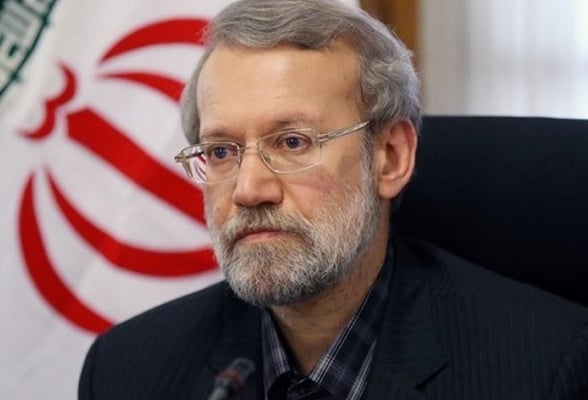The US withdrawal from the 2015 nuclear deal, which placed confidence-building curbs on Tehran’s nuclear program, once again proved that the US claim Iran is secretly developing nukes is only a pretext to place pressure on Iran, Larijani said on Saturday.
The top lawmaker said the main problem of the US with Iran is our tireless support for the Palestinian cause, he was quoted as saying in a report by ICANA.
“[During a round of nuclear talks] I asked the other side what is your problem with us when you know we are not after nuclear weapons? He replied the real problem lies in Iran’s support for Palestine, which does not allow the US to carry out its plans in the region,” said Larijani, a top nuclear negotiator in early 2000s.
Iran has been steadfast in its opposition to Israel since the 1979 Revolution, demanding an end to the decades-long occupation of the Palestinian lands.
Shortly after the Revolution, the Islamic Republic’s founder Ayatollah Rohullah Khomeini singled out the two main enemies of Iran: the US as the “great Satan” and Israel as the “little Satan”.
He further noted that the long-standing US animosity towards Tehran also has its origins in the 1979 Islamic Revolution that toppled the rule of the US-backed Shah Mohammad Reza Pahlavi
“The adventurous policy of the US is rooted in the revolutionary move of 15 Khordad that led to Iran’s independence,” Ali Larijani said.
The uprising is known to be the starting point of a revolution that replaced the Shah monarchy with the Islamic Republic.
Larijani made the remarks in an address to a gathering of people on the eve of the anniversary of the 1963 anti-Shah demonstrations, known as 15 Khordad Uprising.
US Opposed to Anti-Terror Efforts
Larijani further referred to the recent remarks made by US Secretary of State Mike Pompeo, and said the main focus of US demands is Iran’s regional presence, because Iran’s anti-terror efforts in Iraq and Syria have disrupted their plans.
The top lawmaker said the US created ISIS to destabilise the region and prepare the ground for carrying out its plots to topple its enemies, but the collapse of the so-called caliphate set up by ISIS rendered those plans unsuccessful.
“They didn’t want us to engage in anti-terror efforts in the region, so that they can foment insecurity in the region and … block Iran’s path to development,” he said.
The lawmaker was speaking at a time of heightened tensions between Iran and the US.
The US administration, which has hardened Washington’s line on Iran, has threatened to impose the “strongest sanctions in history” against Iran that would ultimately destroy the country’s economy unless it capitulate to a series of 12 “basic requirements”.
Among other conditions, the list asks Tehran to halt missile development, stop what the US claims are Iran’s interventions in the affairs of Iraq, Syria and Yemen and cease support for groups which the US considers terrorist but Iran sees as legitimate resistance forces.
Economic War in the Making
Larijani said the us threats of imposing unprecedented sanctions on Iran shows the US hopes an economic war could make Iranian people dissatisfied with their conditions and weaken Iran’s resolve.
The lawmaker said Iran should work to boost domestic production and make the economy invulnerable to US pressure.
“We face a hard path [to stand against US pressures], but the gains will be outstanding,” Larijani said.
